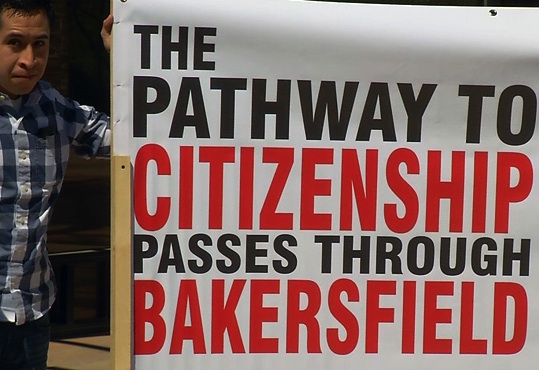As House Republicans gather to discuss the Senate’s “Gang of Eight” immigration reform bill, which is likely to be rejected, supporters of the legislation have pinned their hopes to an unlikely state: California. Though only fifteen of the state’s fifty-three congressional districts are represented by Republicans in the House, many of those have sizable Latino minority populations which the bill’s advocates hope to use as leverage.
In addition, California is home to House Majority Whip Kevin McCarthy, whom immigration reform advocates see as the most vulnerable member of the Republican leadership on the issue. In March, McCarthy told CNN’s Candy Crowley on State of the Union: “I wouldn’t underestimate the House’s ability to pass the immigration bill,” though the Senate had not finalized or passed its “comprehensive” reform bill.
On Tuesday, the bill’s supporters staged a small rally in Bakersfield, in McCarthy’s district, featuring labor leader Dolores Huerta, urging him to allow the Senate bill to proceed in the House. Many of the rally’s attendees drove in from outside the district, particularly from liberal strongholds on the coast, to boost numbers. Still, the rally captured local media attention, which was one of the rally’s primary goals.
McCarthy issued a press statement in response to the rally: “We are a nation of immigrants, but also a nation of laws. You have to consider both principles when addressing our broken immigration system. Throughout history, our country has been made better by the contributions of immigrants. We must secure our borders as a first step in developing a long-term, realistic and enforceable solution.”
California’s Republicans, including McCarthy, are considered appealing targets for all the reasons that the rest of the Republican caucus is not. Though re-districting in 2010 was controlled by Republicans in many states, fortifying many representatives with strong conservative voting blocs, California’s redistricting process was handled by a supposedly independent–but in reality Democrat-leaning–commission.
The result was that even some solidly Republican districts are less reliably conservative than Republican districts elsewhere in the nation. And though recent poll data indicate that most Hispanic voters prefer an “enforcement first” model of immigration reform, a sizable minority does not, meaning that California Republicans have less room to maneuver and may be more vulnerable to pressure, activists hope.
President Barack Obama’s former campaign-turned-non-profit, Organizing for Action (OfA), is leading the charge in California. OfA’s executive director, Jon Carson, visited the state this week to rally immigration reform activists and to raise money for the organization. OfA had already been holding small but visible immigration reform events throughout the state, largely in support of Democrats who favor the Senate bill.
Now OfA is turning its attention to California Republicans in the House, targeting such members as Dana Rohrabacher, Buck McKeon–and McCarthy, knowing that the Republican leadership feels a greater sense of urgency about immigration reform.
Rarely is California a “swing state” anymore, but Democrats and activists hope that they can do enough in the next few weeks to shift momentum back in their favor.
Image source: Bakersfield Now

COMMENTS
Please let us know if you're having issues with commenting.